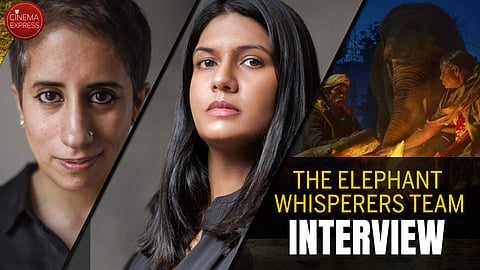

When asked why she decided to back Netflix's The Elephant Whisperers (TEW), a documentary on two mahouts and their elephants, producer Guneet Monga, grinning from ear to ear, makes the most compelling argument ever. “Who can say no to baby elephants?” Well, it was not just Guneet but the Academy Awards too who couldn't resist the charm of the elephants as the documentary made it to the final five nominations under the Best Documentary Short Film category.
Helmed by Kartiki Gonsalves, TEW is a heart-warming tale of a couple Bomman and Bellie, who take two orphaned jumbo calves, Raghu and Ammukutty, under their wings and cradle them as their own. The documentary, set in Theppakadu Elephant Camp of Mudumalai Tiger Reserve, throws light on the human-animal relationship, and the need to preserve nature.
An Oscar nomination may not be a new thing for Guneet, whose 2019 short documentary, Period. End of Sentence, took home the golden statuette. Even as she mentions that such recognition always gives a sense of validation, Guneet emphasises, “We never get into stories thinking about the awards. I feel very spiritual about it. The story chooses us. Kartiki has lived with the story for five years, following up with Bomman, Bellie, Raghu and Ammu. I have been on this journey for 3-3.5 years and the ups and downs have been special for me.”
For Kartiki, it was a chance meeting with Raghu that led her to bond with his family and subsequently fall in love with the baby mammal. The filmmaker first saw Raghu taking a splashy bath in a river while she was driving from Ooty to Bangalore. At the time of their meeting, Kartiki recollects that Raghu couldn’t even use his trunk and was stumbling across the pathway, but shared an astonishing trust level with his human guardians. “I saw this tiny three-month elephant calf that was not any taller than my knee having a bath in a river. This unplanned detour lead me to spend hours with them. Bomman and Raghu shared a special bond, like that of a parent and child.” When Kartiki met Bellie, the former understood that if Bomman was the father of Raghu and Ammukutty, Bellie was the mother.
As a documentary filmmaker, Kartiki was very conscious of breaking the outsider's gaze by spending quality time with the calves and the couple. “Firstly, I spent time building their trust. When they were comfortable with me taking photographs and videos, I initially only used my phones before moving on to GoPro cameras, DSLRs, and then entire camera setups," reveals Kartiki. At the same time, the team was also conscious that TEW reflects the voice of indigenous people. “This was a chance where I was able to give them a voice, which was very important to this story. The way they live and co-exist with nature is something that we need to learn.”
Beyond telling the story of elephants, TEW addresses much more poignant issues like the culture of indigenous people, forest preservation, and normalises taboo issues like widow remarriage and late matrimony. “Asian elephants are losing their habitat due to encroachment and climate change, and calves are getting orphaned. I went with a documentary style because people should understand these issues on a deeper level, and not think it to be even remotely fictional.”
Concurring with Kartiki, Guneet observes that Bomman and Bellie's lives are examples of how to co-exist with nature in a world of overproduction and consumption. “At a time when animals are being driven to extinction, I think this positive story highlights human-animal coexistence. Only with mutual respect and cooperation can we save the planet,” says Guneet.
Beyond all these messages, what also makes TEW more special is how it is fronted by two women. Elaborating on the process, Kartiki says, “I think when it comes to women and telling stories, they go that extra mile. I believe that Bellie opened up because I was a local and a woman. I think it was lovely being a woman and able to tell the story.”
Guneet is also proud of the fact that two women are representing India at the Oscars. “I think inclusivity allows empathy and that forms the heart of the story. We had gender-inclusive sets and with Kartiki leading from the front, it has been an incredible journey,” signs off Guneet with the hope that she can tell a lot more stories on human emotions and soul-intuitiveness.